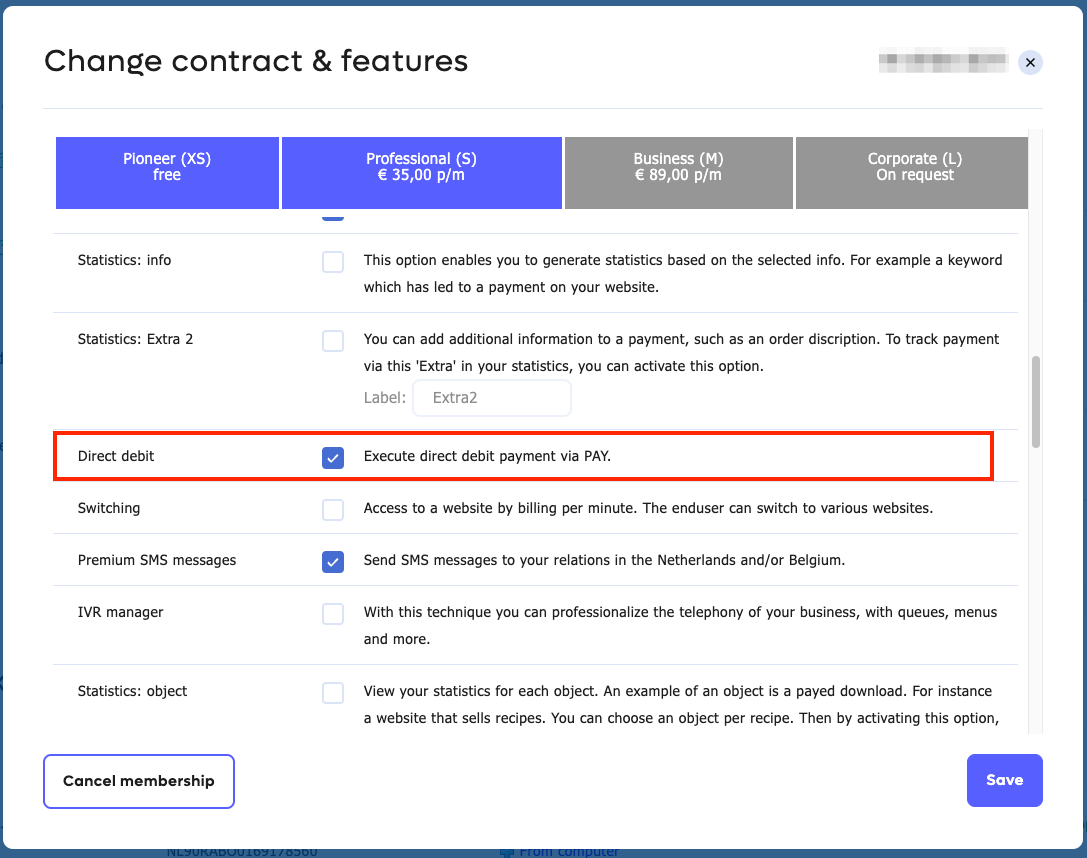Direct Debit & Mandates
Direct debit (also known as SEPA direct debit) is a payment method that automatically debits funds from the consumer's bank account.
This payment method is available when you have at least the Professional (S) package. The full API specifications can be found here.
Prerequisites
To use SEPA direct debit you have to enable a feature under your contract package with Pay. Navigate to Merchant > Company information. Under Contact > Package click on Change contract & features and enable to option Direct debit

In my.pay.nl navigate to the sale location for which you want to enable the SEPA direct debit payment method, located under Alternative payment methods.

You need to add additional settings, by pressing the 'Add' button:
- Name; these settings are shared with other sales locations, therefore you can provide a name for these settings so that you can easily recognize them when adding another sales location.
- T&C URL; The SEPA regulations dictates that your need to have clear terms and conditions displayed on a webpage so that the enduser can easily find and read them. You need to provide the URL of this webpage.
- Payment bank info; You can provide max 30 characters which will be displayed on the enduser (/consumer) bankstatement when the direct debit is executed. This can be an URL, e-mailaddress or phone number.
Our boarding department will check your request to enable SEPA direct debit. You will receive an e-mail when the SEPA direct debit payment method has been activated.
Mandates
You need to have a mandate for each direct debit transaction you want to execute. You can create mandates for a single direct debit transaction, for recurring direct debits or for flexible direct debits.
Objectcodes involved for mandates and directdebit transactions
IO-the object code for a mandate
IL-the object code for executed direct debit transactions
Single direct debit transaction
If you want to execute a single direct debit transaction you need to create a mandate for a single direct debit transaction. This mandate is only valid once and if created successfully will result in one direct debit transaction.
The recipe below shows the payload needed to create a mandate for a single direct debit transaction.
Recurring direct debits
With recurring direct debits, a fixed amount is periodically debited from the consumer's bank account. E.g. per month or per quarter. This makes recurring direct debits especially suitable for subscriptions. The mandate becomes valid if the first direct debit transaction is executed successfully. If this direct debit is declined the other (recurring) direct debits will be not be generated/executed.
The recipe below shows the payload needed to create a mandate for a recurring direct debit transaction.
Via the interval object you can indicate the time when the next direct debit needs to be executed. E.g.
| Period | Value | Frequency |
|---|---|---|
| week | 1 | Weekly |
| week | 2 | Bi-weekly |
| month | 2 | Bi-monthly |
| trimester | 1 | Quarterly |
| halfyear | 1 | Every six months |
| year | 1 | Annually |
| day | 3 | Every 3 days |
The processDate determines the start date. If you select a monthly period with an initial processDate of 01-01-2025, the following automatically created direct debit will be executed on 01-02-2025. If you do not enter a processDate the direct debit will be processed as soon as possible (usually the following business day).
Flexible direct debits
Flexible direct debits are the most flexibele form of direct debits offered by Pay. This form can be used to execute direct debits that are not linked to a certain period, amount or description. The mandate becomes valid if the first direct debit transaction is executed successfully. If this direct debit is declined, other direct debits can't be executed.
To use flexible direct debits, the following steps must be executed
1. Create a mandate for flexible direct debits
Create a mandate for flexible direct debits, see this recipe.
You need to store the IO- code for further usages.
2. Add a direct debit transaction on this flexible mandate
If the mandate is active (which is the case if the initial direct debit that is executed after the creation of the mandate is not not declined) additional direct debit transactions can be created with the DirectDebits:Add API see the recipe below.
Preconditions
The usage of SEPA direct debit is restricted to various conditions, like:
- Number of orders; Limits apply to the number of mandates/direct debits per unique IBAN number per day which can be created. The default limit is one.
- Mandate period of validity; A mandate is valid up to 36 months following the last direct debit
- Amount; Limits apply to the amount to be debited per mandate /direct debit. The default value is € 100,-,
- Maximum total amount; A limit applies to the number of direct debits processed through Pay. The default value is € 10.000,- per 7 days.
These limits above depends on various factors like your branch and your relationship with Pay. If you want to change this, please contact your contact person within Pay. A risk assessment may be executed if you want us to change these limits.
Exchange calls
When a mandate is created an exchangeUrl can be supplied, if no exchangeUrl is supplied the default exchange settings configured on sales location level will be used.
For mandates and direct debits specific exchange calls are introduced, these are described here.
Statuses
A mandate and a direct debit can have several statuses. The statuses are described here in more detail.
Updated 3 months ago